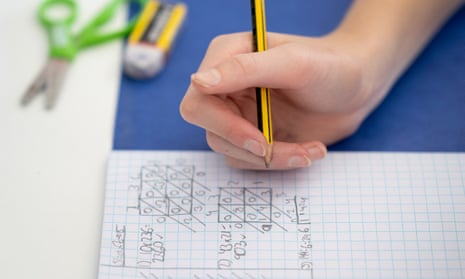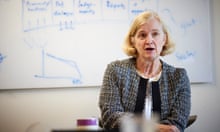Pupils across England have made a recovery in learning lost during the Covid pandemic, but concerns remain over worsening results for disadvantaged secondary school students, according to new research published by the Department for Education.
The findings show a national trend of recovery in reading and maths, especially among primary school pupils, when comparing results between autumn, spring and summer this year. But cold spots remain in parts of England and among pupils who were eligible for free school meals.
“Analysis over the course of the academic year suggests that in the absence of disruption to in-person learning, there are signs of recovery,” said Jon Andrews, the co-author of the report and head of analysis at the Education Policy Institute. “However, this is far from consistent, and recovery has been less pronounced amongst secondary pupils and amongst the most disadvantaged.”
The study found that after the national lockdown in March, primary school children were 3.4 months behind in maths and 2.2 months behind in reading. But by the end of the summer term in June, as pupils returned to school full time, their learning decay had shrunk to 2.2 months in maths and less than a month in reading.
While secondary school students also saw improvements, their recovery was less rapid. In autumn secondary pupils had lost 1.5 months in reading, and by the summer term were still 1.2 months behind on average.
The results for secondary school students from disadvantaged backgrounds showed that they continued to fall further behind. Those who had been eligible for free school meals were 1.9 months behind in reading in autumn 2020 – and by June this year that had widened to 2.4 months.
Geoff Barton, general secretary of the Association of School and College Leaders, said the findings showed that disadvantaged pupils had suffered most in terms of learning lost, and deserved more support from the government. “These children have suffered the greatest educational disruption since the second world war and they need and deserve a far better recovery package.
“The research also finds that a key factor affecting learning loss may be the amount of time pupils were absent from school during periods when schools were fully open. Unfortunately, high levels of Covid-related absence continue this term, and it is therefore absolutely essential that more is done to reduce this disruption,” Barton said.
The results also revealed “significant” regional differences in the extent of lost learning and the speed of recovery.
In one case, primary school pupils in the south-west of England ended the summer slightly ahead in progress in maths, compared with a normal year. But their peers in the east Midlands and north-west appeared to fall further behind. The report’s authors cautioned that the small numbers of pupils tested at regional levels meant that their estimates were less precise.
A DfE spokesperson said: “It’s encouraging to see pupils beginning to close the gaps that opened up over the past 18 months, but we know there is still more to do, in particular for disadvantaged pupils. That’s why this week we announced a further £1.8bn dedicated to supporting young people recover from the impact of the pandemic.”










